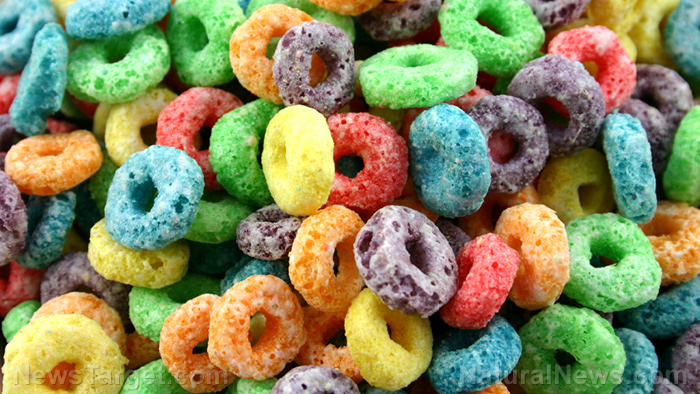Top 10 reasons to avoid toxic high-fructose corn syrup
07/20/2015 / By Carol Young

High-fructose corn syrup is a sugar that begins as a corn starch and through processing becomes a very sweet syrup. Processing the corn converts glucose into fructose, creating a very concentrated sugar. While table sugar and HFCS have molecular similarities, the way the human body processes HFCS can lead to many health problems. High-fructose corn syrup is destroying both the bodies of humans and the honey bees.
Connected to worldwide collapse of bee colonies
Yes, high-fructose corn syrup can cause people to be overweight, sick and undernourished, but perhaps one of the most devastating effects of high-fructose corn syrup is its connection to honeybee colony collapse disorder. Researchers say that, when bees are fed high-fructose corn syrup instead of honey, they are not exposed to compounds that help the bees fight off toxins like the ones found in pesticides. A bee’s natural food staple is its own honey, but beekeepers have been taking their honey away and feeding them with high-fructose corn syrup as a replacement. This practice has been going on since the 70s, and new pesticides that have been developed over time have compromised the immunity response of the bees.
Taking away the honey from the bees is weakening their immune system and making bees more vulnerable to toxins that are meant to kill other bugs. The bees need to keep their honey and build up their immune systems again. The practice of replacing the bees’ honey with highly processed HFCS may potentially decimate their populations, and as they are one of the most important pollinators in the world, this will undoubtedly result in catastrophe. In Oslo, the capital city of Norway, a bee highway is being built to allow for safe passage through the city to help support their bee population.
Neural alterations in HFCS-consuming rats are similar to exposure to addictive drugs
The international peer-reviewed journal Nutrients found that rats who self-administered pellets with high-fructose corn syrup had neural and psychological changes associated with addictive and metabolic diseases. Specifically, the study found that “it took less exposure to sugars with a higher ratio of fructose to glucose to engender both neural and physiological changes associated with addictive and metabolic diseases.”
Raises risk of cardiovascular disease even in healthy young people
A human study published in The Journal of Clinical Endocrinology & Metabolism used young men and women between the ages of 18 and 40; over two weeks, the participants consumed either glucose, fructose or high-fructose corn syrup-sweetened drinks. The results showed that consumption of high-fructose corn syrup drinks for two weeks raised risk factors for cardiovascular disease much more than glucose.
Destroys your liver
The development of nonalcoholic fatty liver disease (NAFLD) may be strongly linked with consumption of high-fructose corn syrup and obesity. One study found that high-fructose corn syrup induced hepatic steatosis (fatty liver) and mitochondrial disruption. Additionally, when the liver breaks down high-fructose corn syrup, the body’s triglycerides elevate, along with blood pressure and harmful LDL cholesterol.
Speeds up the aging process
High-fructose corn syrup is absorbed by the liver quickly and is converted into a fat. This increases the production of aging free radicals which can damage DNA and the cells.
Gout and arthritis – increases uric acid
A build up of uric acid is what causes gout, a form of arthritis which is characterized by pain and tenderness often at the joint at the base of the big toe. A study done at the Boston University School of Medicine found that, as one drinks sweetened soft drinks, their risk of gout attack increases. Fructose increases uric acid, which in turn leads to chronic low-level inflammation. There is speculation that elevated uric acid levels could lead to hypertension, kidney disease and obesity.
Tooth decay
High-fructose corn syrup causes intense blood fluctuations due to the high amount of concentrated fructose, and this strips minerals from our teeth and bones. Teeth that are stripped of minerals are open to decay. The high-fructose corn syrup also leaves deposits of sugar on the teeth, and the bacteria already present in your mouth feeds on these sugars. Citric acid, found in soda, can also wear down the protective enamel on your teeth. Tooth decay remains one of the most prevalent chronic diseases among both children and adults in the United States, and is also one of the most preventable conditions. The number of dental caries, or cavities, in children has soared since the 1990s. The production of high-fructose corn syrup also peaked in the 1990s.
Do you remember “Mountain Dew mouth”? The widespread problem with tooth decay in Appalachia has been contributed to drinking Mountain Dew, which contains high amounts of sugar coming from high-fructose corn syrup.
Gastrointestinal distress
High-fructose corn syrup consumption can cause bloating, fullness, abdominal pain, indigestion, constipation, diarrhea and belching. A study in the journal Medical Hypotheses found that fructose malabsorption was one of the main causes of patients suffering from Irritable Bowel Syndrome and their symptoms could be alleviated simply by cutting fructose, like high-fructose corn syrup, out of their diets.
Weight gain
In another experiment, rats who had access to high-fructose corn syrup did not maintain a normal body weight. The study published in Pharmacology Biochemistry and Behavior in 2010 observed that rats which consumed high-fructose corn syrup had increased body fat and triglyceride levels. Rapid weight gain was observed in rats that consumed high-fructose corn syrup compared to animals that only consumed fructose and sucrose. Rats which were fed a diet that was rich in high-fructose corn syrup for six months showed abnormal weight gain and augmented fat deposition. These are indicators of obesity, and the study concluded that it is very possible that overconsumption of foods and drinks full of high-fructose corn syrup could be fueling the “obesity epidemic.”
Mercury exposure
Mercury was found in 50% of commercial high-fructose corn syrup samples, and nearly one-third of 55 popular brand-name beverages and food products also contained mercury. These products often have high-fructose corn syrup as one of the main ingredients, and the brands included Quaker, Hershey’s, Smucker’s and Kraft. Many of these brands are targeted at children. “Mercury is toxic in all its forms,” said the Institute for Agriculture and Trade Policy’s David Wallinga, M.D. The amount of high-fructose corn syrup in so many food products for children is alarming. The American Academy of Pediatrics emphasizes that minimizing children’s exposure to mercury is important for optimal nervous system development. According to the World Health Organization, even small amounts of mercury exposure can be detrimental.
Sources:
http://smartypantsvitamins.com
http://www.rothfusfamilydental.com
https://www.deltadentalins.com
http://www.nutritionandmetabolism.com
Submit a correction >>
Tagged Under:
addiction, bee colonies, heart disease, high-fructose corn syrup, liver disease, mercury
This article may contain statements that reflect the opinion of the author
RECENT NEWS & ARTICLES
COPYRIGHT © 2017 TOP 10 GROCERY SECRETS





















